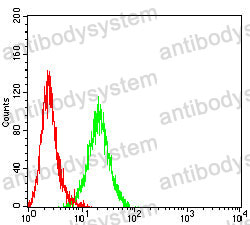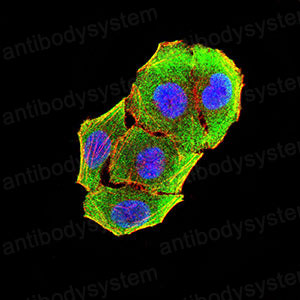Catalog No.
RHA57702
Species reactivity
Human
Host species
Mouse
Isotype
IgG1
Clonality
Monoclonal
Tested applications
ELISA: 1:10000, FCM: 1:200-1:400, IF: 1:50-1:200, WB: 1:500-1:2000
Target
SKCa 4, KCa4, Intermediate conductance calcium-activated potassium channel protein 4, SKCa4, IKCA1, SK4, KCNN4, Putative Gardos channel, IKCa1, KCa3.1, KCA4, IK1
Concentration
1 mg/ml
Endotoxin level
Please contact with the lab for this information.
Purity
>95% as determined by SDS-PAGE.
Purification
Protein A/G purified from cell culture supernatant.
Accession
O15554
Applications
ELISA, FCM, IF, WB
Form
Liquid
Storage buffer
0.01M PBS, pH 7.4, 0.05% Sodium Azide.
Stability and Storage
Use a manual defrost freezer and avoid repeated freeze-thaw cycles. Store at 4°C short term (1-2 weeks). Store at -20°C 12 months. Store at -80°C long term.
Clone ID
R2U80
KCNN4 as a genomic determinant of cytosolic delivery by the attenuated cationic lytic peptide L17E., PMID:39748507
Exploring dual effects of dinutuximab beta on cell death and proliferation of insulinoma., PMID:37802653
Anti-Inflammatory Effect of Licochalcone A via Regulation of ORAI1 and K+ Channels in T-Lymphocytes., PMID:34639190
KCNN4-mediated Ca2+/MET/AKT axis is promising for targeted therapy of pancreatic ductal adenocarcinoma., PMID:34183755
KCNN4 promotes the progression of lung adenocarcinoma by activating the AKT and ERK signaling pathways., PMID:33896824
Co-staining of KCa 3.1 Channels in NSCLC Cells with a Small-Molecule Fluorescent Probe and Antibody-Based Indirect Immunofluorescence., PMID:33043595
Dataset of KCNQ1, KCNN4, KATP channel expression and dexamethasone modulation of protein kinase signaling in airway epithelial cells., PMID:31720320
Toll-like receptor protein 4 monoclonal antibody inhibits mmLDL-induced endothelium-dependent vasodilation dysfunction of mouse mesenteric arteries., PMID:31494123
Long-Term Increase of Kcnn4 Potassium Channel Surface Expression on B Cells in Pemphigus Patients after Rituximab Treatment., PMID:30472996
Kcnn4 is a modifier gene of intestinal cystic fibrosis preventing lethality in the Cftr-F508del mouse., PMID:29915289
The role and mechanism of KCa3.1 channels in human monocyte migration induced by palmitic acid., PMID:29792849
Blockade of KCa3.1: A novel target to treat TGF-β1 induced conjunctival fibrosis., PMID:29242028
Phosphatidlyinositol-3-kinase C2 beta (PI3KC2β) is a potential new target to treat IgE mediated disease., PMID:28820911
Altered activation of peripheral CD8+ T cells in pediatric Crohn's disease., PMID:28300604
Novel function of α1D L-type calcium channel in the atria., PMID:27884747
Identification of PGAM5 as a Mammalian Protein Histidine Phosphatase that Plays a Central Role to Negatively Regulate CD4(+) T Cells., PMID:27453048
The anti-proliferative effect of cation channel blockers in T lymphocytes depends on the strength of mitogenic stimulation., PMID:26861999
Complementary roles of KCa3.1 channels and β1-integrin during alveolar epithelial repair., PMID:26335442
NMDA-receptor antagonists block B-cell function but foster IL-10 production in BCR/CD40-activated B cells., PMID:25477292
Ca2+ -activated K+ channel-3.1 blocker TRAM-34 alleviates murine allergic rhinitis., PMID:25466273
Multiple mineralocorticoid response elements localized in different introns regulate intermediate conductance K+ (Kcnn4) channel expression in the rat distal colon., PMID:24901797
Different calcium influx characteristics upon Kv1.3 and IKCa1 potassium channel inhibition in T helper subsets., PMID:24827427
The K+ channel KCa3.1 as a novel target for idiopathic pulmonary fibrosis., PMID:24392001
Endothelin-1 receptor antagonists regulate cell surface-associated protein disulfide isomerase in sickle cell disease., PMID:23913858
Functional KCa3.1 channels regulate steroid insensitivity in bronchial smooth muscle cells., PMID:23904164
The potassium channel KCa3.1 as new therapeutic target for the prevention of obliterative airway disease., PMID:23325003
NADPH oxidase 2-derived superoxide downregulates endothelial KCa3.1 in preeclampsia., PMID:23261940
KCa3.1 channels mediate the increase of cell migration and proliferation by advanced glycation endproducts in cultured rat vascular smooth muscle cells., PMID:23212096
Inflammatory bowel disease: an impaired barrier disease., PMID:23160753
The inhibition of KCa3.1 channels activity reduces cell motility in glioblastoma derived cancer stem cells., PMID:23110108
Advanced glycation end products promote proliferation of cardiac fibroblasts by upregulation of KCa3.1 channels., PMID:23053478
NS6180, a new K(Ca) 3.1 channel inhibitor prevents T-cell activation and inflammation in a rat model of inflammatory bowel disease., PMID:22891655
Systemic effects of ingested Lactobacillus rhamnosus: inhibition of mast cell membrane potassium (IKCa) current and degranulation., PMID:22815978
Phosphatidylinositol-3-kinase C2β and TRIM27 function to positively and negatively regulate IgE receptor activation of mast cells., PMID:22645315
T-lymphocyte calcium influx characteristics and their modulation by Kv1.3 and IKCa1 channel inhibitors in the neonate., PMID:20601376
Blunted IgE-mediated activation of mast cells in mice lacking the Ca2+-activated K+ channel KCa3.1., PMID:18523267
Dynamics of single potassium channel proteins in the plasma membrane of migrating cells., PMID:18287336
Facilitation of Ca2+-activated K+ channels (IKCa1) by mibefradil in B lymphocytes., PMID:18188587
Adenosine closes the K+ channel KCa3.1 in human lung mast cells and inhibits their migration via the adenosine A2A receptor., PMID:17474152
AMA production in primary biliary cirrhosis is promoted by the TLR9 ligand CpG and suppressed by potassium channel blockers., PMID:17256753
The Ca(2+)-activated K(+) channel KCa3.1 compartmentalizes in the immunological synapse of human T lymphocytes., PMID:17151145
Gene expression in rat lacrimal gland duct cells collected using laser capture microdissection: evidence for K+ secretion by duct cells., PMID:16638994
Role of an S4-S5 linker lysine in the trafficking of the Ca(2+)-activated K(+) channels IK1 and SK3., PMID:16135513
Beta2-adrenoceptor regulation of the K+ channel iKCa1 in human mast cells., PMID:15817638
The K+ channel iKCA1 potentiates Ca2+ influx and degranulation in human lung mast cells., PMID:15241346
K+ channel expression during B cell differentiation: implications for immunomodulation and autoimmunity., PMID:15240664
Small-conductance calcium-activated K+ channels are expressed in pancreatic islets and regulate glucose responses., PMID:12882916
Identification of transcription coactivator OCA-B-dependent genes involved in antigen-dependent B cell differentiation by cDNA array analyses., PMID:12857960
The hSK4 (KCNN4) isoform is the Ca2+-activated K+ channel (Gardos channel) in human red blood cells., PMID:12773623
Trafficking of the Ca2+-activated K+ channel, hIK1, is dependent upon a C-terminal leucine zipper., PMID:12493744


